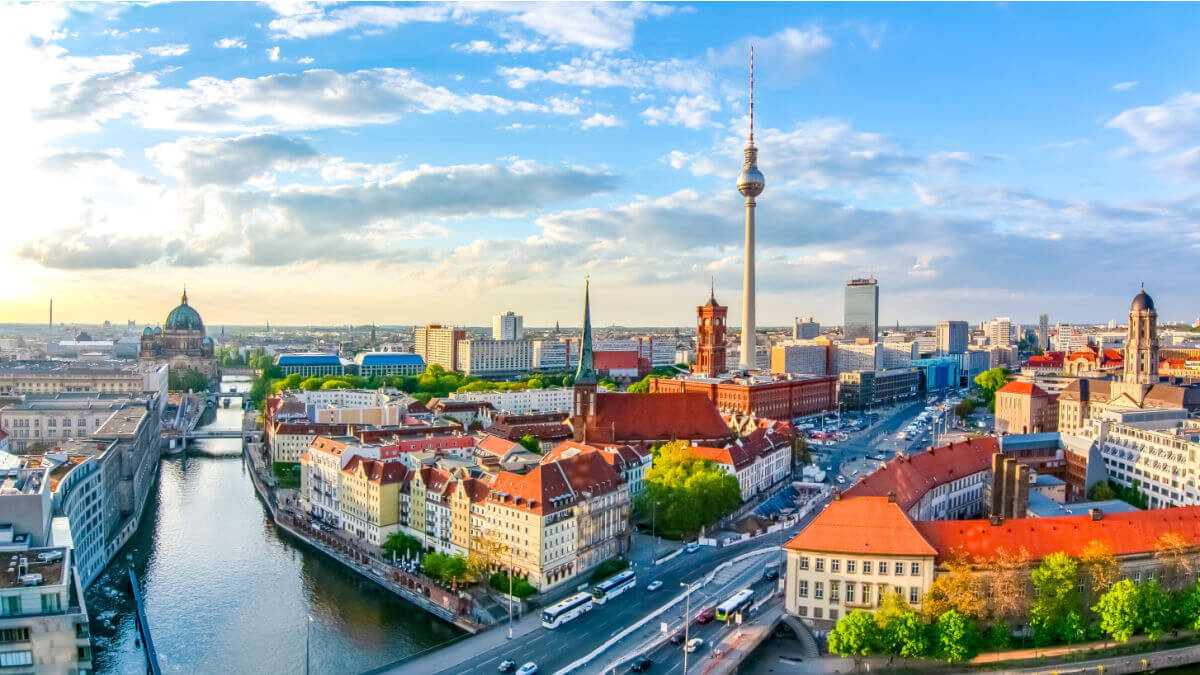How to transfer UK pension to Germany
Read our helpful guide on how to transfer a UK pension to Germany, including the steps, fees and taxes involved.

Thinking of taking the leap and moving to Germany? If you like living in a stable country with a strong economy, you will thrive there. In this guide, we cover what you should know about moving to Germany from the UK including how to get a visa, the cost of living and even options for retiring in Germany, plus much more.
We’ll also show you how Wise might be a cost-effective way to manage your money across borders. Open a Wise account and you can send money between the UK and Germany for low fees* and at the mid-market exchange rate.
Learn more about the Wise account

Want to take your savings with you? Wise can also help you with large transfers. Simply email our expert team or request a call back below.
Yes, you can move to Germany from the UK, but you’ll need to follow EU rules. While you don’t need a visa for entry, you will need one for longer stays.1
Since Germany is in the Schengen Area, you can stay for up to 90 days without a visa. However, if you plan to stay longer or work in Germany, you’ll need to apply for a permit.1
Post-Brexit, the rules for UK citizens moving to Germany and the EU in general have changed, making the process more complex. While you can still move to Germany from the UK, it now requires additional paperwork. One major change is that British citizens must get a visa for stays longer than three months.1
The visa you’ll need in order to move to Germany is the long-stay visa, also known as the D visa. There are three main types: work visas, student visas and visas for family reunion.2
Work visas usually last up to 5 years, after which you can apply for a permanent residence permit. There are many work visa categories, including visas for scientists, skilled workers and those starting their own business in Germany.2
The documents you need for your visa application can sometimes include proof of the reason for your stay, evidence of necessary qualifications for your job or study placement and proof that you speak basic German. The latter is usually required for family reunion visas.2

The process of moving to Germany from the UK will depend on your plans after you arrive. If you plan to work, you’ll need to get a job offer in order to get a visa. The only exception to this rule are the categories of graduates and skilled workers with vocational qualifications, who can get a work visa to look for a job for up to six months.2
You’ll also need an acceptance letter from a German educational institution in order to study there.2
The quickest way to travel from the UK to Germany is by plane, with April generally being the cheapest month to fly, starting at just £13.3
These low fares are often limited deals, but affordable tickets are still available for certain routes. For example, flights from London to Frankfurt typically range from £30 to £150.4
Wise could help you save money on travel costs, especially if you’re paying in a foreign currency. With the mid-market exchange rate and no foreign transaction fees*, you’ll be able to make the most out of your money. With a Wise card you can buy flight tickets to Germany, and start spending as soon as you arrive, without having to worry about converting currency or unexpected fees.
Now that the UK is no longer part of the EU, moving your belongings requires a slightly different process. Hiring a moving company is your best option, as they’ll be familiar with the latest import regulations for every country.
You can transport your belongings by air or road freight. While air freight is faster, road freight is more budget-friendly.5
Here are some companies you could consult:
Having a Wise account could be very useful when paying for a moving company. It allows you to send, receive and spend in both British pounds and euros. With transparent, low fees* and transactions at the mid-market exchange rate, so no need to worry about unexpected fees for currency conversion or added mark-up from banks or other providers.
Here are some basic facts about Germany if you’re considering moving there:
| 💰Currency: | Euro (EUR) |
|---|---|
| 🗣️Main language: | German |
| 👥Population: | 84,217,3996 |
| 🇬🇧 Number of British expats: | Around 168,0007 |
| 🧭Popular expat destinations: | Berlin, Hamburg, Munich, Frankfurt, Düsseldorf |

The cost of living in Germany is lower compared to the UK, especially when it comes to rent, which is around 24% cheaper. Also, restaurant prices are around 10% lower in Germany.8
Let’s take a look at a few average prices for common spending categories in Germany, compared with the UK:8
In order to open a bank account in Germany, you must be a resident. There are two main types of bank accounts in Germany, current and savings, and you’ll find them under the names Girokonto and Sparkonto.9
Depending on the bank and the type of account you want to open, the documentation you’ll need varies. However, most banks will require some of these things:
Also, besides providing your ID, you’ll be asked to prove your identity officially. You can do this at a post office or online, following the post-ident identity check procedure.9
Many international banks also have branches in Germany, so you might not need to open a whole new account. You just need to arrange with your bank in the UK that the account gets transferred to Germany.
And whether you’ll be able to keep your UK bank account after moving depends on your bank. For example, Barclays closes your account once you move abroad.10
📚 Opening an account in Germany as a Brit
And, as an alternative to a bank account, check out the Wise account. You can use it to send, receive and spend in multiple currencies, including British pounds and euros. Opening the account is pretty straightforward and you can open it before you even leave the UK.
Germany has a relatively low unemployment rate, so finding a job is usually not a major issue.¹¹ However, it’s a good idea to start looking into jobs even before you officially move. Not only will it save you time, it might influence some other decisions about your new life in Germany.
Here are some of the most popular job seeking websites in Germany:
For those that are still working on their German, there are also websites for jobs in English only. Examples are The Local and English Jobs. Teaching English is also something that’s in demand, so if you’re qualified, there might be a spot for you.11
Once you’re settled in Germany, you could contact the Federal Employment Agency (Bundesagentur für Arbeit) and get their help. They also offer German language courses and different consultations.11

Finding a suitable place to live is one of the most important things to do when moving to any new country. Whether it’s renting or buying, picking a perfect apartment is most likely going to require effort and patience.
As a foreigner, you can also buy property without any difficulty. The only potential obstacle is financing, since you should expect a bigger down payment and a higher interest rate.12
The final step in buying property is drafting and signing a contract. For this, it’s best to hire an English-speaking notary, so that you avoid any potential errors. Also, the finalised contract will be read aloud in German, so you might want to consider bringing a translator with you.12
📚 Buying and financing a house abroad
Prefer to rent? Finding a place to rent is usually done online in Germany, through one of many popular housing portals. Some of them are:
You'll need to pay a security deposit, which can be up to three months' rent and is payable in three monthly installments. In major cities, rent control laws limit landlords to setting rents no more than 10% above the local average.13
Given the costs involved in all of the above, it makes sense to find a provider with low fees* and transparent pricing. Wise may save you money, especially on currency conversion fees on larger amounts. Our dedicated team of experts can help assist you with every step of your transfer. Simply email us or request a call back below.
All German residents need to have some sort of health insurance. It can be either state insurance (gesetzliche Krankenversicherung) or private (private Krankenversicherung). The majority of Germans have state insurance. It can be either paid for by you or by your German employer, by being taken from your salary. If you want to, you can add your dependents to your statutory insurance free of charge.14
Before seeing a doctor, make sure they take statutory-insured patients. You’ll recognise them if they’re registered as a statutory health insurance doctor (Kassenarzt), contract doctor (Vertragsarzt) or Alle Kassen, which means they take all insurance.14
Besides your monthly contributions, you still might need to pay for some services. For example, a day in the hospital is 10 euros. Also, you’ll need to pay for prescription medication, same as in the UK.14
Here’s what you should know when moving to Germany with a family:
In Germany, education is compulsory for children between the ages of six and either fifteen or sixteen, depending on the school. It consists of five stages: early childhood education, primary education, secondary education, tertiary education and continuing education.15
Attending university is usually free for both locals and foreigners. You’ll only pay nominal fees which range from €100 to €350 per semester.15
Basic pregnancy and childbirth costs will be covered by state health insurance, but get private insurance if you want complete coverage. Your prenatal tests and appointments will be managed by the community midwife, who communicates with doctors and hospital staff.16
The child can get German citizenship if you have permanent residence. Also, you can claim parental leave for up to three years. This only applies to those who pay into the social security scheme.16
Your pet must arrive within five days of your entry, with an ISO-compliant microchip and proof of rabies vaccination. Certain breeds, including pit bulls and Staffordshire terriers, are prohibited from being imported.17
📚 Travelling with your pets
Relaxing and spending your retirement in one of Europe’s most stable countries sounds very appealing. Here’s how you can make that a reality.
Germany doesn’t have special retirement visas like some other countries. Therefore, you just need a regular visa or residence permit if you wish to retire in Germany.18
If you manage to retire in Germany, you can also claim your UK state pension there. It can be paid into a UK bank account or a German one, in which case you’ll be paid in the local currency. You can choose how often you’ll get paid - anywhere from 4 to 13 weeks. Contact the International Pension Centre to get the most recent information.¹⁹
📚 Transferring UK pension to Germany
Let’s go through the most important steps of moving to Germany from the UK:
There are several ways to move to Germany, each requiring careful preparation. To simplify the process and save money, you might want to consider options other than your bank.
Open a Wise account and you can send money between the UK and Germany for low, transparent fees* and the mid-market exchange rate. It’s not a bank account but offers many similar features.
You can also use Wise once you arrive in your new home. You can spend in euros from the moment you step off the plane using your Wise card. It works in 150+ countries and automatically converts your pounds to the local currency, only adding a tiny, upfront currency conversion fee*.
Remember, if you’re moving to Germany, Wise can help with sending or receiving large amounts, our dedicated team of experts are ready to help with every step of your transfer. Simply email us or request a call back below.
Sources used:
1. Gov.uk - entry requirements
2. Expatica - visas and immigration in Germany
3. Skyscanner - UK to Germany flights
4. Skyscanner - London to Frankfurt flights
5. Pickfords - shipping to Germany
6. Worldometers - Germany population
7. Daily Express - number of British expats
8. Numbeo - cost of living in Germany compared to the UK
9. Expatica - opening a bank account
10. Barclays - living outside the UK
11. Expatica - working in Germany
12. Global Property Guide - buying property in Germany
13. Expatica - renting
14. Gov.uk - healthcare in Germany
15. Studying in Germany - education in Germany
16. Expatica - having a baby in Germany
17. Pet Travel - pet import requirements
18. Germany Visa - retiring in Germany
19. Gov.uk - State Pension if you retire abroad
Sources last checked on date: 13-Mar-2025
*Please see terms of use and product availability for your region or visit Wise fees and pricing for the most up to date pricing and fee information.
This publication is provided for general information purposes and does not constitute legal, tax or other professional advice from Wise Payments Limited or its subsidiaries and its affiliates, and it is not intended as a substitute for obtaining advice from a financial advisor or any other professional.
We make no representations, warranties or guarantees, whether expressed or implied, that the content in the publication is accurate, complete or up to date.

Read our helpful guide on how to transfer a UK pension to Germany, including the steps, fees and taxes involved.

A guide that explains the German residence permit, how it works, who can apply, how to apply and costs.

Are you or your partner expecting? While this is meant to be a very exciting time in your life, sometimes medical expenses and navigating public or private...

Holidays in Germany are celebrated differently than in many parts of the world. Germans take their holidays very seriously, with celebrations that are steeped...

Germany is so much more than sausages and beer. The country boasts incredibly low unemployment, a high quality of life, and a wonderful mix of history,...

Germany is already home to a healthy expat community and a thrivng tourism industry. From the parties and rich culture of Berlin, to the rich food and medival...